Health
5 silent killer-foods Nigerians love

Nigerian cuisine is renowned for its rich flavors, vibrant colors, and diverse ingredients.
However, amid the array of delicious dishes, there are some foods that, despite their popularity, pose significant health risks.
Here are five silent killer foods that many Nigerians love:
1. Suya (Carcinogenic)
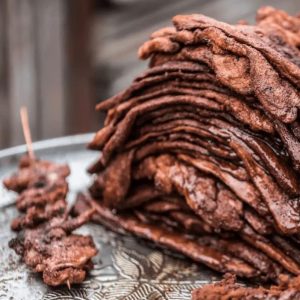
Suya
Suya, a spicy skewered meat popular across Nigeria, is a favorite street food enjoyed by many. However, this tasty delight comes with a hidden danger. The process of grilling meat at high temperatures can lead to the formation of carcinogenic compounds known as heterocyclic amines (HCAs) and polycyclic aromatic hydrocarbons (PAHs). These compounds have been linked to an increased risk of cancer. Regular consumption of suya, particularly when it is charred, can elevate this risk, making it a silent killer on the dinner table.
2. Shawarma (Due to Hot Dogs)
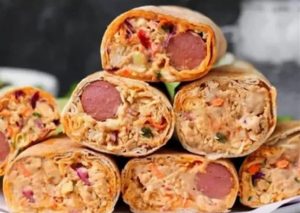
Shawarma
Shawarma, a Middle Eastern-inspired wrap filled with spiced meat, vegetables, and sauces, has become immensely popular in Nigeria. Often, hot dogs or other processed meats are used in the filling, which contain preservatives like nitrates and nitrites. These preservatives can convert into nitrosamines, which are carcinogenic. Furthermore, processed meats have been linked to various health issues, including heart disease and diabetes. Despite its delicious taste, frequent consumption of shawarma can contribute to these health problems.
3. Nkwobi (Excess Potassium)
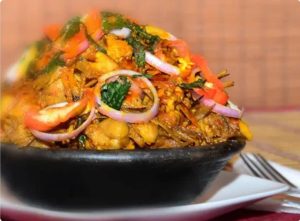
Nkwobi
Nkwobi, a delicacy made from cow feet cooked in a spicy palm oil sauce, is a beloved traditional dish. However, it is also a silent killer due to its high potassium content. For individuals with kidney problems or those at risk of hyperkalemia (high potassium levels), consuming Nkwobi can be dangerous. Excess potassium can lead to irregular heartbeats and even heart failure. While it is a flavorful dish, those with existing health conditions need to be cautious about its consumption.
4. Kilishi
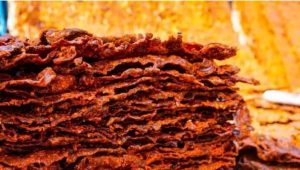
Kilishi
Kilishi, a dried, spicy meat similar to jerky, is another Nigerian favorite. The drying and seasoning process often involves adding a significant amount of salt, which can contribute to high blood pressure (hypertension). Although kilishi is a convenient and tasty snack, its high salt content makes it a silent threat to cardiovascular health.
5. Deep-Fried Snacks
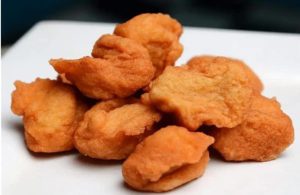
Deep Fried Snacks (Akara)
Deep-fried snacks such as puff-puff, buns, akara (bean cakes), and plantain chips are immensely popular in Nigeria. These snacks, while delicious, are often cooked in unhealthy oils that contain trans fats. Trans fats are known to increase bad cholesterol (LDL) levels and decrease good cholesterol (HDL) levels, leading to an increased risk of heart disease, stroke, and type 2 diabetes. Additionally, the high-calorie content of deep-fried foods can contribute to obesity, which is a risk factor for numerous chronic diseases.
Health
BREAKING: Senate President Akpabio Currently Hospitalised In London After Collapse, Misses Key Budget Session – Sources

According to the sources, Akpabio “collapsed on the 10th of this month and was rushed to London in a private jet provided by billionaire businessman, Aliko Dangote.”
The Senate President, Godswill Akpabio, is currently ill and receiving medical treatment at a hospital in London, the United Kingdom, after reportedly collapsing earlier this month, top sources from the National Assembly have told Ekwutosblog.
According to the sources, Akpabio “collapsed on the 10th of this month and was rushed to London in a private jet provided by billionaire businessman, Aliko Dangote.”
The sources added that this development has kept the Senate President away from official duties, including the Medium Term Expenditure Framework (MTEF) and Fiscal Strategy Paper (FSP) interactive session held on Wednesday.
SaharaReporters was informed that Akpabio’s condition is serious enough to warrant continued overseas medical care.
A source disclosed that “this is the second time he is being rushed to London for treatment,” raising fresh concerns about his health and capacity to continue leading the upper legislative chamber.
Multiple senators are said to have travelled to London to check on him. One of the sources said, “A number of senators have gone to visit me,” in reference to Akpabio’s hospitalisation abroad.
The sources further revealed that medical experts attending to the Senate President have reportedly advised him to reduce his workload.
According to one of the briefings received by SaharaReporters, “Doctors are advising him to step down from the Senate to attend to his health.”
Akpabio’s absence was felt at the flag-off of the MTEF and FSP interactive session, a crucial engagement between the executive and the legislature that outlines Nigeria’s medium-term fiscal and economic plans.
SaharaReporters gathered that he “has already missed today’s Medium Term Expenditure Framework presentation today.”
In his stead, the Senate President was represented by Senator Onyekachi Nwaebonyi at the event, confirming Akpabio’s inability to attend the session in person.
Further indications of Akpabio’s condition emerged from aides monitoring developments around his return.
One source was quoted as saying, “One of the aides just told me now that they are going to pick the guy from the airport,” suggesting ongoing logistical arrangements around his movement.
Akpabio’s last public appearance appeared to be on December 9 when the Nigerian Senate formally approved President Bola Tinubu’s request to send Nigerian troops to the Republic of Benin to support efforts to restore peace and stability following an attempted coup.
Senate President, Godswill Akpabio, had announced the approval during the plenary, after lawmakers deliberated the request in the Committee of the Whole under section 5, Part II of the Constitution.
The Senators voted unanimously in favour, granting legislative backing for the regional security intervention.
Akpabio had described the decision as a critical move, emphasising that unrest in a neighbouring country poses risks to the entire West African region.
“An injury to one is an injury to all,” Akpabio had said, stressing Nigeria’s duty to support its ECOWAS partners in maintaining regional stability.
Health
Robotic surgeries now happening in many private hospitals in Nigeria- Muhammad Ali Pate, Minister Of Health & Social Welfare

Nigeria’s healthcare sector just got a major boost! Minister of Health and Social Welfare, Muhammad Ali Pate, has announced that robotic surgeries are now being performed in several private hospitals across the country.
This marks a significant milestone in Nigeria’s medical landscape, positioning the country as a hub for advanced surgical care in West Africa.
The Toumai Pro Robotic Surgery Platform, recently launched at Nisa Premier Hospital in Abuja, is a game-changer. This state-of-the-art technology enables surgeons to perform complex procedures with enhanced precision, reducing recovery time and complications.
Some benefits of robotic surgery include:
Minimally invasive: Smaller incisions, less pain, and faster recovery
Increased precision: Enhanced dexterity and accuracy
Reduced complications: Lower risk of infection and bleeding
Hospitals like Nisa Premier Hospital, Kelina Hospital, and Lagoon Hospital are already offering robotic surgery services. This development is expected to attract medical tourism, boost Nigeria’s healthcare sector, and improve patient outcomes.
As Minister Pate puts it, “This is not just a milestone for Nigeria, but for the entire African continent”.
https://www.instagram.com/reel/DSRb0Q3DH71/?igsh=MXBscG4yY2dhOXBqZA==
Health
Osun Hospital Allegedly Detains Newborn Over Mother’s N700,000 Medical Debt

A private hospital in Osun State has come under public attention following reports that it is detaining a newborn baby over an unpaid medical bill estimated at N700,000. The incident has generated public concern and renewed discussions about patients’ rights and medical ethics in Nigeria.
The case involves a young mother who reportedly experienced serious medical complications during childbirth, leading to extended hospital care for both her and the baby. After treatment was completed and the newborn was declared medically stable, the hospital allegedly refused to discharge the child, insisting that the outstanding bill must be settled first.
Sources say the family has already paid a significant amount for medical services but has been unable to raise the remaining balance due to financial hardship.
Relatives of the mother have appealed for understanding, stating that the continued stay of the newborn in the hospital has placed emotional and psychological strain on the family.
The hospital management is reported to have justified its position by pointing to past experiences where patients left without paying their medical bills. According to the management, unpaid debts affect the hospital’s ability to operate and provide services to other patients.
The situation has attracted criticism from members of the public and human rights advocates, who argue that holding patients, particularly newborns, over unpaid bills is unethical and contrary to basic human rights principles. Some legal observers have also suggested that such actions may conflict with existing laws and professional medical standards.
As public reaction continues to grow, there have been calls for the Osun State Government and relevant health authorities to step in, facilitate the release of the newborn, and address systemic issues that allow such incidents to occur.
The case has once again drawn attention to the broader challenges facing Nigeria’s healthcare system, especially the financial burden on families and limited access to affordable healthcare.
-
Business1 year ago
US court acquits Air Peace boss, slams Mayfield $4000 fine
-

 Trending1 year ago
Trending1 year agoNYA demands release of ‘abducted’ Imo chairman, preaches good governance
-

 Politics1 year ago
Politics1 year agoMexico’s new president causes concern just weeks before the US elections
-

 Politics1 year ago
Politics1 year agoPutin invites 20 world leaders
-

 Politics1 year ago
Politics1 year agoRussia bans imports of agro-products from Kazakhstan after refusal to join BRICS
-
Entertainment1 year ago
Bobrisky falls ill in police custody, rushed to hospital
-
Entertainment1 year ago
Bobrisky transferred from Immigration to FCID, spends night behind bars
-
Education1 year ago
GOVERNOR FUBARA APPOINTS COUNCIL MEMBERS FOR KEN SARO-WIWA POLYTECHNIC BORI













